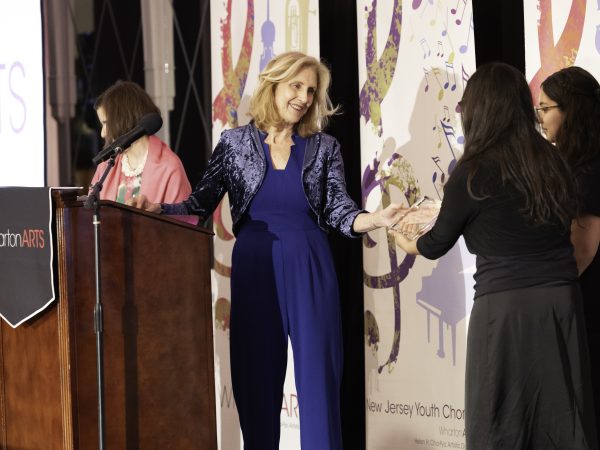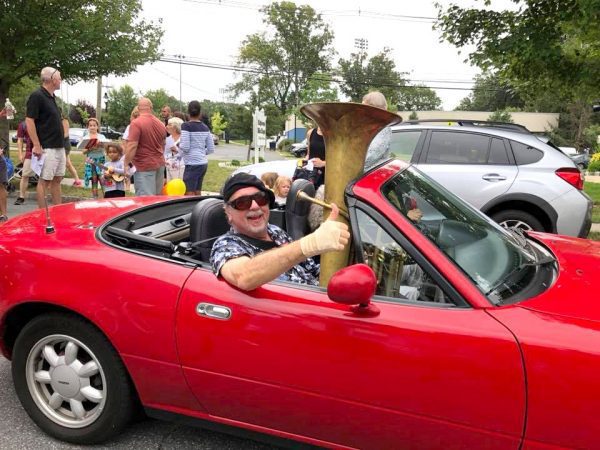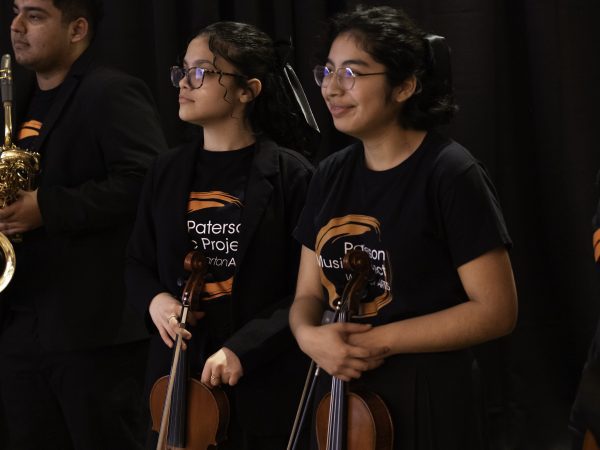There’s a saying that all politics is local. Perhaps the same could be said about music education advocacy.
Maplewood resident Tricia Tunstall, who recently won the 2025 Wharton Arts Education Award for her work documenting and promoting the global movement for social impact through music education, started her world-wide journey locally.
Tunstall has written about the El Sistema program in Venezuela and many like-spirited programs in far-flung places, from South America to Africa to the Middle East to Asia and back to the U.S., in her most recent book Playing for Their Lives: The Global El Sistema Movement for Social Change Through Music (co-authored with her husband, Eric Booth). Her previous book, Changing Lives: Gustavo Dudamel, El Sistema, and the Transformative Power of Music, won a 2013 ASCAP Award and the 2016 Prix Des Muses in France. It has been published in six languages.

Tunstall receiving her Wharton Arts award from students from Wharton Arts’ Paterson Music Project, which she helped launch a decade ago.
But Tunstall’s advocacy story begins in Maplewood, where she moved in 1991 with her first husband, jazz pianist, conductor and composer Donald Johnston, after their second child was born. Johnston died in 2002.
“In Maplewood, I sort of fell into piano teaching by accident and loved it,” said Tunstall in a recent interview.
“I was a pianist, writer, lyricist — I had done all kinds of things, and at that point I wanted to stay home with the kids when they were little. Some neighbors said, ‘You know, you play piano, would you teach my kid?’ I said, ‘I don’t know how to teach your kid,’ but I started anyway, and just learned through experience.”
“And now, I can’t imagine leaving Maplewood. I feel so connected to this community.”
Tunstall majored in Philosophy at Yale and has a master’s from Columbia in historical musicology. She explained, “After 15 years in New York City, with my husband working as a conductor and arranger on Broadway and the two of us writing for Off Off Broadway theaters and being really intensely in those worlds, I was used to thinking about art and music on a New York City professional level.”
“And then — within a year or two of moving here — I met Jim Buchanan,” she said. “And I feel like Jim Buchanan really changed my life, changed the whole paradigm for me.“
In her tribute to Buchanan after his death in 2023, Tunstall wrote that he “was a seminal figure in the creation of the Maplewood we know.” Buchanan activated and renovated the Burgdorff Center as a community arts space; spearheaded the creation of Arts Maplewood; became Maplewood’s first Cultural Affairs Director and “invented the job as he went”; formed Maplewood Community Music, an umbrella group of homegrown ensembles; masterminded classical chamber concerts; and supported the growth of the 1978 Maplewood Arts Center.
On a personal level, said Tunstall, Buchanan gave her “a different way to think about what’s powerful about music and the arts.”
“He sponsored a couple of concerts of Donald and my music, and I started getting involved in the Burgdorff Center and Arts Maplewood. It was so profound. And remember Music for Kids? It was Jim’s program for children on Sunday mornings at the Burgdorff. It was so profound what Jim was doing. It was a beautiful thing. He touched every single kind of person who lives here: retired people, kids, music-loving amateurs, skilled professionals. He found every way that you could make music a powerful catalyst for community.”

Jim Buchanan
“And so Maplewood became much more of a community because of that.”
Tunstall said these experiences are what led her to become interested in Venezuela’s El Sistema model.
“There was a direct connection there. Although the Sistema model is top down and financed by the national government, it’s extremely local in what goes on. Kids in each neighborhood come together for these amazing ensemble education programs every day after school for hours and hours. The parents are fully supportive. The teachers come from the community. It’s like 5,000 Maplewoods. It happens on an intensely community basis.” Tunstall says that El Sistema in Venezuela is now 50 years old and “has been so successful in not only creating equitable community education, but also developing extraordinary musicians.”
“They have provincial orchestras and they have a national children’s orchestra and a national youth orchestra, and they tour those orchestras. So that’s happening on a nationwide basis. But I think the reason it caught my heart when I went to Venezuela, of course, was that it is so local. Each community has decided how much they value this chance that their kids are getting. And it harnesses the energies of parents and grandparents and teenagers and little kids, everyone sort of creating these enclaves where kids can learn together so well. I think that had I not gone through the ’90s with Jim and the community in Maplewood, I might not have been so tuned into that.”
“Maplewood kind of primed me for recognizing that.”
“And then I started following how El Sistema-inspired models have developed all over the world,” Tunstall added. “It’s not only programs that have been directly influenced by El Sistema, but also all kinds of programs rising up independently that are about ensemble music education for various kinds of social impact. And it’s all over the world. Tunstall talked about a seacoast town in Japan where there is a program for children who lost parents in the 2011 tsunami and another program in the mountains of Colombia where the youth have been impacted by gang conflict.
“This seems to be an idea whose time has come,” she said. “Kids who are under stressful situations of any kind — put them together in intensive music learning situations and they won’t be less hungry and they won’t be out of danger, but they’ll feel a sense of peace and security and togetherness.”

Students from Wharton Arts’ Paterson Music Project.
Tunstall says she’s honored by the recognition from Wharton Arts: “It’s an outstanding example of community arts energy and commitment—and it’s right here in New Jersey, just a few towns over. Not only is it home to the New Jersey Youth Symphony; it’s also been sponsoring an El Sistema-inspired program in Paterson for over a decade.”
In her hometown, Tunstall is a longtime community arts activist. She was co-president, with Debby Jacoby, of the CHS Music Parents Association from 2007 to 2009, and she served as Maplewood’s Director of Arts and Culture from 2008 to 2011. She co-founded the Maplewood Arts Council, with Marcy Thompson, in 2012, and led it until 2018; she’s still an active member. In 2019, she led a fundraising effort to buy a concert grand piano for the DeHart Center, and she helps coordinate a yearly community recital series there.
And the spirit of Jim Buchanan’s inspiration is coming full circle: Tunstall says she’s now working with Thompson (now Arts Council chair) on an idea to bring back a version of the Arts Maplewood program, Music for Kids.
“I was inspired by Jim. Really an extraordinary person—just joyful.”
Stay tuned.

